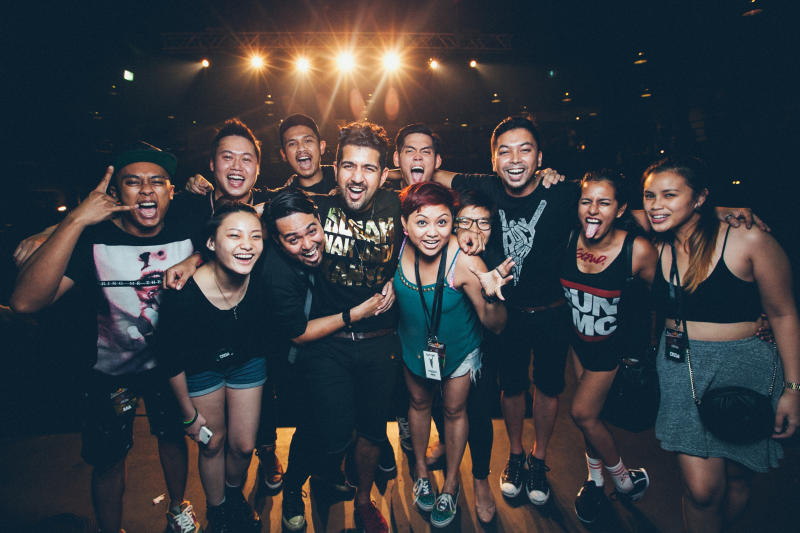By JAYDEE LOK
alltherage@thestar.com.my
THE plug has just been pulled on the Ke$ha concert you’ve been organising for months, your company is caught in the glare of the international media because of it, and you have millions of ringgit at stake – what do you do? For Livescape co-founder and director Iqbal Ameer, the answer is simple – keep calm and carry on.
Under events agency Livescape, Iqbal has seen his share of successes and crises. Thanks to his entrepreneurial vision, they’ve managed to bring superstar acts like Psy, Rita Ora, Fun., Swedish House Mafia, Paramore and many more to Malaysia. But in the past month alone, they’ve also had to manage the cancellation of both Ke$ha and metal band Lamb Of God’s shows.
“A lot of people don’t know failure,” said Iqbal, who is still only 27. “Nobody wants to talk about failure.”
Perhaps it’s his philosophical take on failure that has helped him and his company ride the waves and keep moving on.
“The whole company is experienced enough to handle these situations,” said Livescape head of public relations Jason Kong. “We were more shocked than we were freaking out (over the Ke$ha cancellation) and I think this incident has kept all of us together. Livescape isn’t just a company – it’s more like a family and we work together best in a crisis.”
But at the end of the day, Livescape is a business, and Iqbal is a businessman – one who has built an impressive empire at a relatively young age. So how did he do it?
The budding businessman
Iqbal’s entrepreneurial aspirations started when he was in primary school. He came from a frugal family, and was taught from an early age to spend within his means.
“My family wasn’t well off when I was young,” said Iqbal. “My daily makan was rice, fish, egg and kicap – every day.”
Iqbal soon decided to take his fate into his own hands with his first business venture – selling trading cards to schoolmates. It didn’t make him much money, but it taught him something invaluable – how to make a good sales pitch.
“I had to pitch that ‘this is the card for you’, even when it wasn’t,” said Iqbal, who bought the cards at 50 sen and sold them for RM1. After a while, he got so annoyed that he couldn’t manipulate the cost of the cards, he started printing his own using his mother’s printer.
The money he made was spent on his passion – comic books, which became his second business venture.
“Comics are like stamps. You can buy a comic and sell it off for more later,” he said. His biggest sale was the last Spiderman issue drawn by Todd McFarlane, a cool RM300. Not too bad for a teenager.
His comic book business was doing so well his father once accused him of stealing money from him.
“I still remember that very clearly, because my dad couldn’t believe it. He was like, ‘what do you mean you’re selling comics?’ He didn’t get it.”
And then came a succession of similar small business ventures. He rented out neckties to other students before the weekly assembly spot-checks. He persuaded a handphone salesman to sell him phones at a cheaper price so he could sell them to his schoolmates. When the school suspended him for that, he started selling sports jerseys. The boy was a natural.
But it was while he was pursuing his degree in public relations at RMIT University in Melbourne, Australia that Iqbal made the jump to the big time. He made a small fortune organising events, and at the age of 22, made enough money to open a restaurant with a friend. They eventually doubled their investment when they sold off the restaurant.
Early lessons
Obviously, Iqbal’s restaurant business wasn’t an instant success.
The boys’ first mistake was trying to “be everything”. On top of being a restaurant, they tried to turn their venue into a function room and a conference room and a meeting room. Their second mistake was serving customers cheaper drinks to save money.
“That‘s when I learnt we couldn’t cheat ourselves through things,” said Iqbal. “So we said to ourselves: ‘Let’s be honest. Let’s figure our business out – what we can do and what we can’t do.”
When he returned to Malaysia after completing his studies, Iqbal started another business with a few friends. It was an ice cream truck called Kreme Kart, which quickly turned into another lesson he had to learn.
Iqbal realised that the business would only be sustainable with 15 trucks operating at the same time. “Kreme Kart had to go to events to make money.
“And at those events, I would often think to myself: ‘Come on, I could do a better job at this.’” And that’s how Livescape, the events agency, was born.
Livescape is born
With the same friends he started Kreme Kart with – Jeremy Lim, 28, Hazily Harri (Bobo), 27, and Ku Reza, 27 – Iqbal founded Livescape. Along the way, they roped in current directors Adam Matthews, 38, and Rahul Kukreja, 30, who had the network and contacts they didn’t; and that’s when they got the ball rolling – after a few initial hiccups.
“Our first four events failed miserably because there were so many things we didn’t anticipate,” said Iqbal. “We had to learn a lot about cash flows because by the time we made money from our fifth event, we had already put in an offer for another act.”
That’s when they decided to make Livescape a creative and events agency, on top of their role as concert promoters.
Dealing with the stars
Getting to deal with some of the biggest artistes in the world might sound like a lot of fun, only that it’s not.
“Their agents are really difficult. I really can’t sit down and listen to them,” said Iqbal, who added that they often stay up to the wee hours of the morning dealing with agents.
Handling all that is a job for his fellow Livescape directors Matthews and Rahul. Iqbal hardly bothers with the backstage business, which is why he’s hardly ever photographed with all the stars he brings in.
“Adam and Rahul do most of (the handling or artistes) because they have a better relationship with the agents.
“For certain scenarios, we even have to play good cop, bad cop (during negotiations); and I’m always playing the bad cop because I don’t know these guys so well,” he added.
The ‘Livescape model’
According to Iqbal, events are “very hit and miss”. Judging by what happened with Ke$ha and Lamb Of God, it’s hard to disagree.
“You don’t make money for all your events so the formula we usually do is ‘one to four’. One out of four events will lose money – we just need to know how big that event will be.”
And to further shield themselves from the volatility of the industry, Livescape has focused on creating and promoting concert series, rather than single acts.
Lamb Of God, for instance, were meant to be just one of several acts to perform at Livescape’s popular Rockaway series this year. The other acts, which included British rockers Bring Me The Horizon and Enter Shikari, were able to keep the series alive.
With “platforms” like Rockaway, NSFW (focusing on electronic dance music acts) and Future Music Festival Asia (the one festival to unite them all), Livescape have been able to gain a loyal following for their multi-act shows, instead of having to promote individual acts that may only appeal to a small group of fans.
Future Music Festival Asia
After spending two years lobbying the organisers of the popular Future Music Festival in Australia, Livescape finally got the green light to launch Future Music Festival Asia (FMFA). Then it was time to think about money.
According to Iqbal, the accepted music festival business model around the world will only see organisers make money after their fifth festival. FMFA broke even in its second year.
“We were targeting 40,000 people in the second year, and we got 55,000. That was when we realised, ‘hey, this could work!’
“There was no cross-genre festival that big in South East Asia. We looked at festivals like Tomorrowland (Belgium) and Ultra Music Festival (United States) and we realised people would travel to attend festivals, so we went to the Ministry of Tourism. We had to convince them to have some faith in us to pull off a festival, which they wouldn’t normally do.”
The problem with local concert-goers, according to Iqbal, is they have a culture of not wanting to pay for their tickets. After seeing the amount of people tweeting about waiting for newspapers and radio stations to give away free tickets, Livescape decided to buck the trend.
“We had to hold strong and not give out free tickets. That’s how we’ve built and strengthened our relationship with festival-goers. Twenty-five thousand people attended the first FMFA and we still lost money!”
Putting together an event the size of FMFA obviously has its challenges. Iqbal and his team have to adhere to an exhaustive quality control manual from their Australian counterparts, who once freaked out when they saw a foreign worker working with the stage crew without proper shoes and harness.
“We don’t do everything we can based on gut feeling anymore,” said Iqbal. “We used to get excited and agree to things thinking we’ll figure out how to do it later, but we’re pulling away from that now.




Tell us what you think!